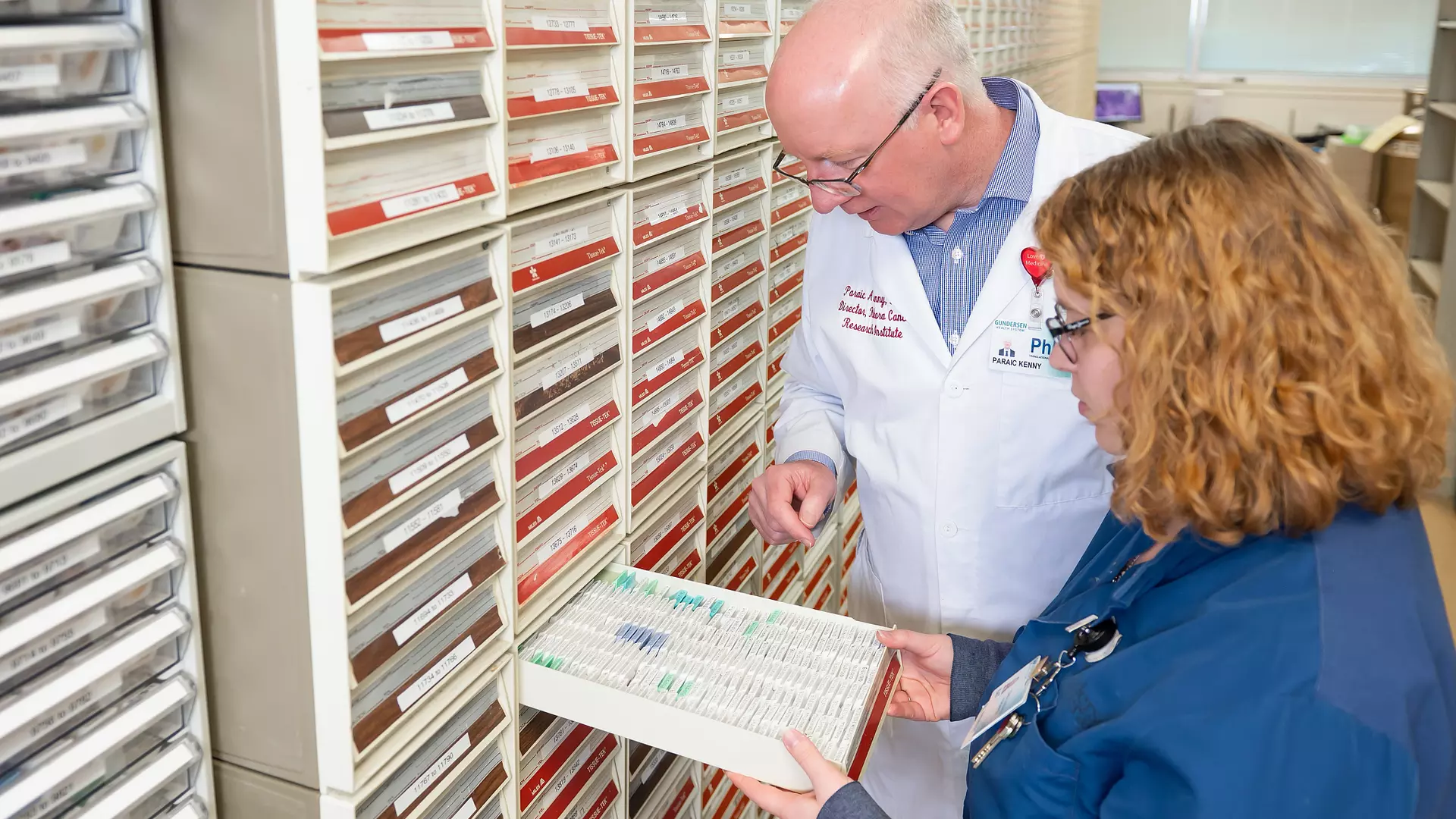
Breast Cancer Research
Breast cancer research scientists at our Kabara Cancer Research Institute in La Crosse, Wis., are changing the way breast cancer is treated locally and nationally.
Kabara Cancer Research Institute
Research spanning decades has revolutionized the treatment of breast cancer, leading to earlier diagnosis and improved outcomes. Despite tremendous advances, breast cancer still claims the lives of more 42,000 women in the U.S. each year.
Our Kabara Cancer Research Institute, led by Paraic Kenny, PhD, studies breast cancer at the molecular level using genomics, molecular and cellular biology, and genetically engineered mouse models. The team’s focus is precision oncology. This new era of genomic medicine tailors treatments to each patient based on their unique genes—and offers newfound hope.
Support local breast cancer research
Life-changing breast cancer research happens in our backyard. However, it wouldn’t be possible without your tremendous support. Funding from Gundersen Medical Foundation’s annual Steppin’ Out in Pink breast cancer fundraising walk enables our research scientists to move quickly to investigate promising new therapies and, often, to perform studies on patient specimens while the patient is going through treatment. Research directly impacts the way we care for your family and friends—and future generations. Join us in supporting breast cancer research initiatives at Gundersen.
-
780
patients enrolled in our precision oncology research cohort
-
2.2
trillion DNA letters genomically sequenced since 2016
-
75
breast cancer studies published in medical journals
Breast cancer research accomplishments
Precision medicine
Results of precision oncology research at Gundersen’s oncology research lab are promising. To date, we:
Are among the key contributors to Wisconsin’s Precision Medicine Molecular Tumor Board. This statewide forum of clinicians, pathologists and scientists has provided expert guidance on more than 10,000 cancer cases to date
Developed research models in the laboratory to characterize mutations in important cancer genes, like GATA3 and BRAF. These findings guide future therapies in diseases with similar genetic patterns
3D breast cell cultures
Our researchers are among the pioneering developers of methods for physiological three-dimensional culture of breast cells outside the body and the application of this technique to study the complexities of breast cancer.
Genetically engineered mouse models
We’ve developed genetically engineered mouse models for GRB7 and GATA3, to study the impact of these genes on breast cancer development, as well as methods for the next-generation sequencing of mouse tumors.
Antibody-based drug development
Building on a decade-long program that implicated the pubertal mammary growth factor, Amphiregulin, in the development of estrogen receptor positive mouse and human breast tumors, we successfully developed the first experimental antibody treatment targeting cell surface Amphiregulin. Our subsequent work has described excessive Amphiregulin activity in several other solid tumor types, broadening the range of tumors in which this treatment option could be explored.
Tools for next generation sequencing (NGS) analysis
We’ve developed several tools to provide enhanced interpretation of clinical tumor sequencing reports. These include a tool to infer the position of amplicon boundaries (which affects the likelihood of tumor response to therapies targeting amplified genes) as well as machine-learning approaches to infer tumor-of-origin based on mutation profiles from specimens with diagnostic uncertainty.
Breast cancer researchers

Paraic Kenny, PhD
Director of the Kabara Cancer Research Institute and Gundersen Cancer Biobank
Dr. Kenny has 25 years of experience in breast cancer research and is a clinical adjunct associate professor of medicine at the University of Wisconsin – Madison.

Kristopher Lofgren, PhD
Research scientist
Dr. Lofgren is an expert in mouse models of mammary gland development and tumorigenesis, with emphasis on receptor tyrosine kinase pathway signaling.
Publications
Activation of nemo-like kinase in diamond blackfan anemia suppresses early erythropoiesis by preventing mitochondrial biogenesis
Published on: 2024-07-11Diamond Blackfan Anemia (DBA) is a rare macrocytic red blood cell aplasia that usually presents within the first year of life. The vast majority of patients carry a mutation in one of approximately 20 genes that results in ribosomal insufficiency with the most significant clinical manifestations being anemia and a predisposition to cancers. Nemo-like Kinase (NLK) is hyperactivated in the erythroid progenitors of DBA patients and inhibition of this kinase improves erythropoiesis, but how NLK...
Read moreGrb7 knockout mice develop normally but litters born to knockout females fail to thrive
Published on: 2023-12-23CONCLUSIONS: These data suggest a regulatory role for Grb7 in mammary lactational physiology.
Read moreExceptional Response to Crizotinib With Subsequent Response to Cabozantinib in Metastatic, ROS1-GOPC Fusion-Mutated Breast Cancer
Published on: 2023-07-24No abstract
Read morePan-cancer distribution of cleaved cell-surface amphiregulin, the target of the GMF-1A3 antibody drug conjugate
Published on: 2022-09-16Amphiregulin is a transmembrane protein which, when cleaved by the TACE/ADAM17 protease, releases a soluble epidermal growth factor receptor ligand domain that promotes proliferation of normal and malignant cells. We previously described a rabbit monoclonal antibody, GMF-1A3, that selectively recognizes the cell-associated cleaved amphiregulin epitope. Antibody-drug conjugates had anti-tumor activity against human breast cancer xenografts. Several tumor types express amphiregulin, but evidence...
Read moreOptimized infection control practices augment the robust protective effect of vaccination for ESRD patients during a hemodialysis facility SARS-CoV-2 outbreak
Published on: 2022-07-22CONCLUSIONS: Prompt recognition of an infection cluster and rapid intervention efforts successfully ended the outbreak. Alongside consistent adherence to core infection prevention measures, vaccination was highly effective in reducing disease incidence and morbidity in this vulnerable population.
Read more
More from Gundersen Research Institute

News
Stay current on our research initiatives, achievements and more.

Researchers
Get to know our research leaders and scientists, find out how to contact them and take a look at their work.




